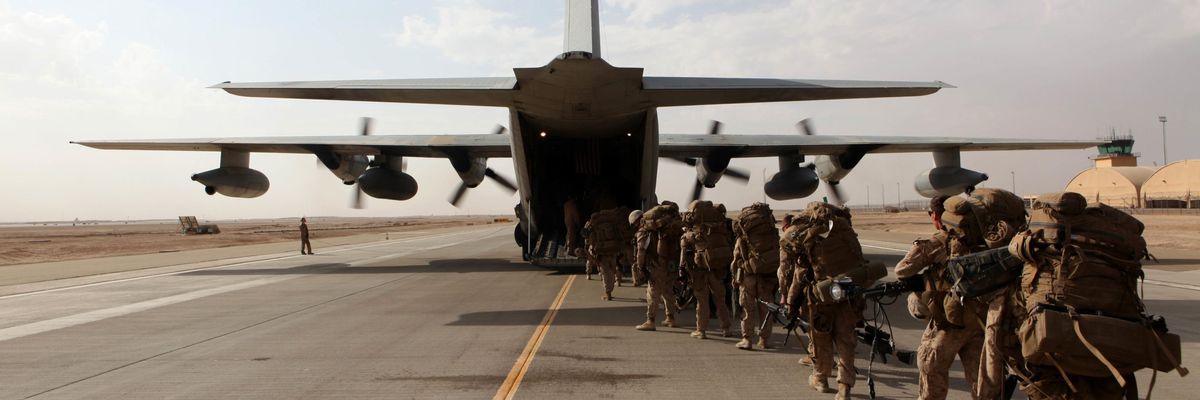In a deal with the Taliban, the Trump administration has laid out the conditions for U.S. withdrawal from Afghanistan. Opponents have criticized the arrangement as the terms for American “surrender,” with some predicting an intensified outbreak of violence in the name of securing full Taliban control. After 18 years of fighting, The Bulwark’s Shay Khatiri laments Trump’s willingness “to simply throw in the towel unconditionally and walk away, as Nixon did in Vietnam.”
In some important respects, the recent U.S. agreement with the Taliban does resemble the January 1973 agreement the Nixon administration signed with the communists in Vietnam. But that may not be all bad news.
As in Vietnam, the deal sets up a ceasefire in place and a withdrawal of U.S. troops and is essentially a face-saving agreement for the United States to get out. And as in Vietnam, the United States has largely excluded locals allied with Washington from the negotiations. The Vietnam analogy also suggests that as U.S. troops are withdrawn, there will be a much reduced interest in the area among policymakers and the public and gradual cutbacks in financial support for the local regime.
In this agreement, the Taliban pledged not to allow Afghanistan to become a base for international terrorists. But this concession was probably pretty painless for them: though factions of the Taliban still maintain relations with al-Qaeda, the two groups never got along very well. The Taliban had nothing to do with 9/11, and they correctly blame al-Qaida for the American attack that destroyed the regime in 2001.
What will happen next?
The Vietnam analogy suggests that after a decent interval, the Taliban will attack the Kabul regime and take over the country. If that happens, the Vietnam experience suggests that American decision-makers and the public will greet the debacle with a shrug and that, after an even longer interval, the US and the new regime will patch up their differences and become buddies.
However, there are some important differences between the two situations.
For one thing, it is not at all clear that the Taliban has the military capacity to really take over the whole country — although it is at least possible to imagine a facilitating condition in which the local, U.S.-trained forces simply disintegrate as they did in Vietnam in 1975.
Perhaps more importantly, in this conflict there are not simply two sides as there were in Vietnam. In Afghanistan there are multiple forces under warlord and other local groups, an elaborate criminalized drug business, and various insurgent groups including a small, and much-despised, ISIS affiliate.
Any regime in Kabul, then, would more likely to preside over a decentralized, or partitioned, confederacy than to establish a unified entity. In fact, this is how Afghanistan has traditionally been organized.
Because of this, there may be some hope, however unlikely, that Kabul and the Taliban will actually be able to work out a decentralized power-sharing accommodation. Indeed, under that condition, the United States has found it appropriate to actually aid the Taliban in the battle it has waged against ISIS since 2015.
There are also two other considerations suggesting that a degree of peace and stability might eventually evolve in Afghanistan.
One involves the bone-deep exhaustion of the Afghan people with the endless war in which they have been the chief victim and which has contributed to a very substantial refugee flow. A brief ceasefire in 2018 received an ecstatic welcome, and Afghans throughout the country took the opportunity to urge both sides to stop the violence.
The other involves the desire of neighboring countries to see the destabilizing Afghan conflict ended. These include Russia, China, Iran, Pakistan, and (more complicatedly) India. Most of them would also be quite happy if a final settlement included the removal of American troops from the area and the dismantling of U.S. military bases, which they often see as threatening. Although these states often have conflicting regional interests and priorities, they all desire a peaceful and stable Afghanistan. Presumably they can’t do any worse than the United States has managed.
No arrangement to end the U.S. war in Afghanistan will be perfect. Afghanistan’s problems can’t be solved through U.S. military occupation; nor will they be solved by a full U.S. withdrawal. In Vietnam, Americans eventually accepted the futility of the mission. While Washington should take reasonable steps to ensure peace as it withdraws from Afghanistan, there’s no use denying that the appropriate measure here, as it was then, is to leave.















